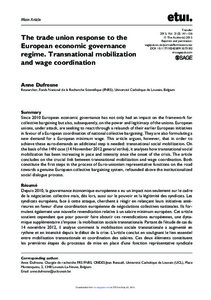The trade union response to the European economic governance regime. Transnational mobilization and wage coordination

Transfer. European Review of Labour and Research
2015
21
2
May
141-156
EU policy ; governance ; minimum wage ; multinational bargaining ; social dialogue ; trade union ; wages ; EU economic governance
Trade unionism
http://dx.doi.org/10.1177/1024258915573182
English
Bibliogr.
"Since 2010 European economic governance has not only had an impact on the framework for collective bargaining but also, subsequently, on the power and legitimacy of the unions. European unions, under attack, are seeking to react through a relaunch of their earlier European initiatives in favour of a European coordination of national collective bargaining. They are also formulating a new demand for a European minimum wage. This article argues, however, that in order to achieve these euro-demands an additional step is needed: transnational social mobilization. On the basis of the 14N case (14 November 2012 general strike), it analyses how transnational social mobilization has been increasing in pace and intensity since the onset of the crisis. The article concludes on the crucial link between transnational mobilization and wage coordination. Both constitute the first steps in the process of Euro-unionism representative functions on the road towards a genuine European collective bargaining system, refounded above the institutionalized social dialogue process."
Digital;Paper
The ETUI is co-funded by the European Union. Views and opinions expressed are however those of the author(s) only and do not necessarily reflect those of the European Union or the ETUI.